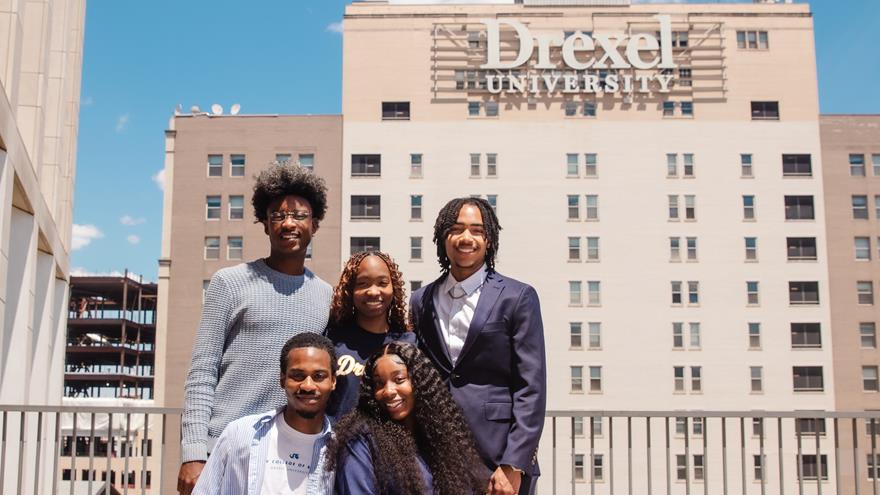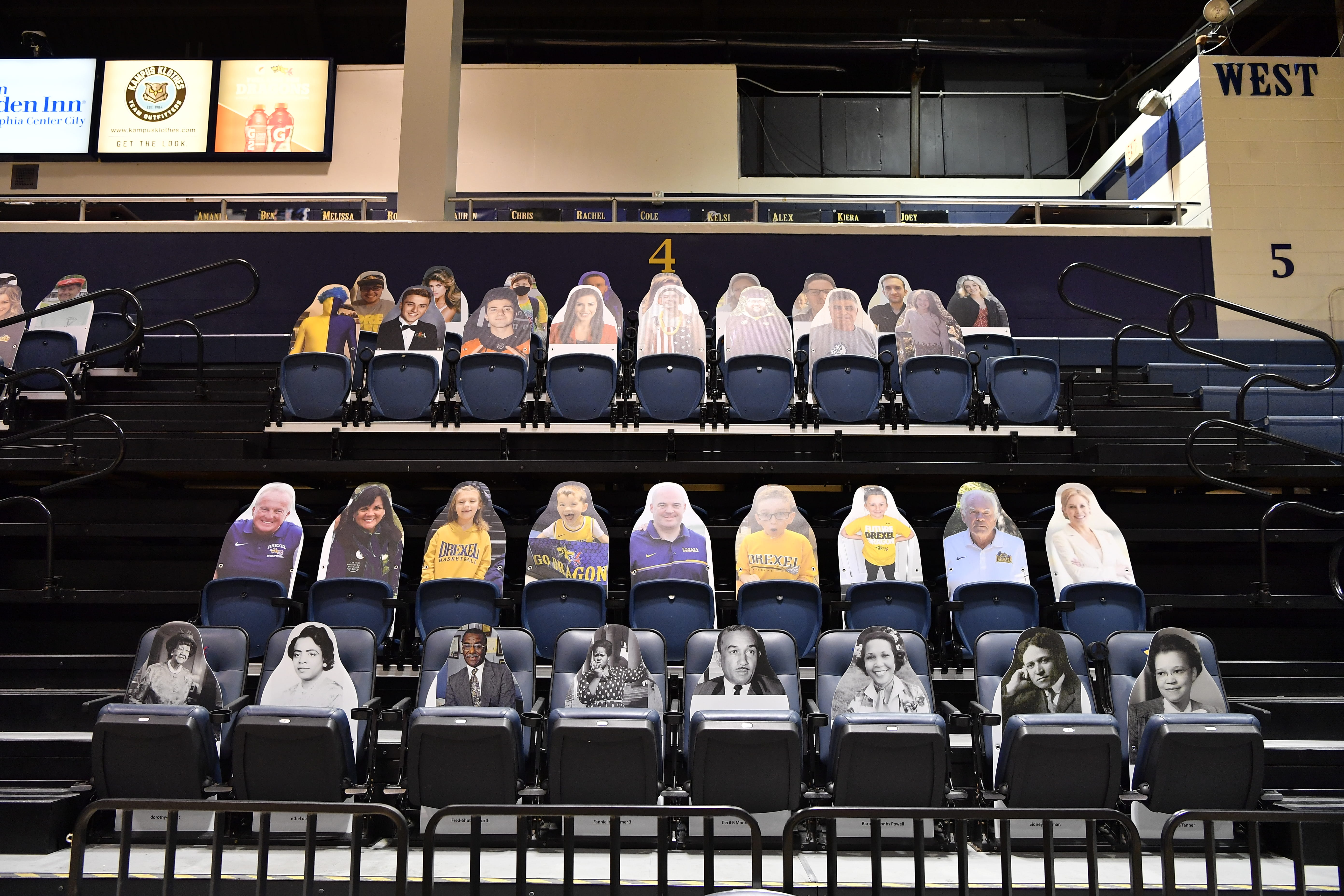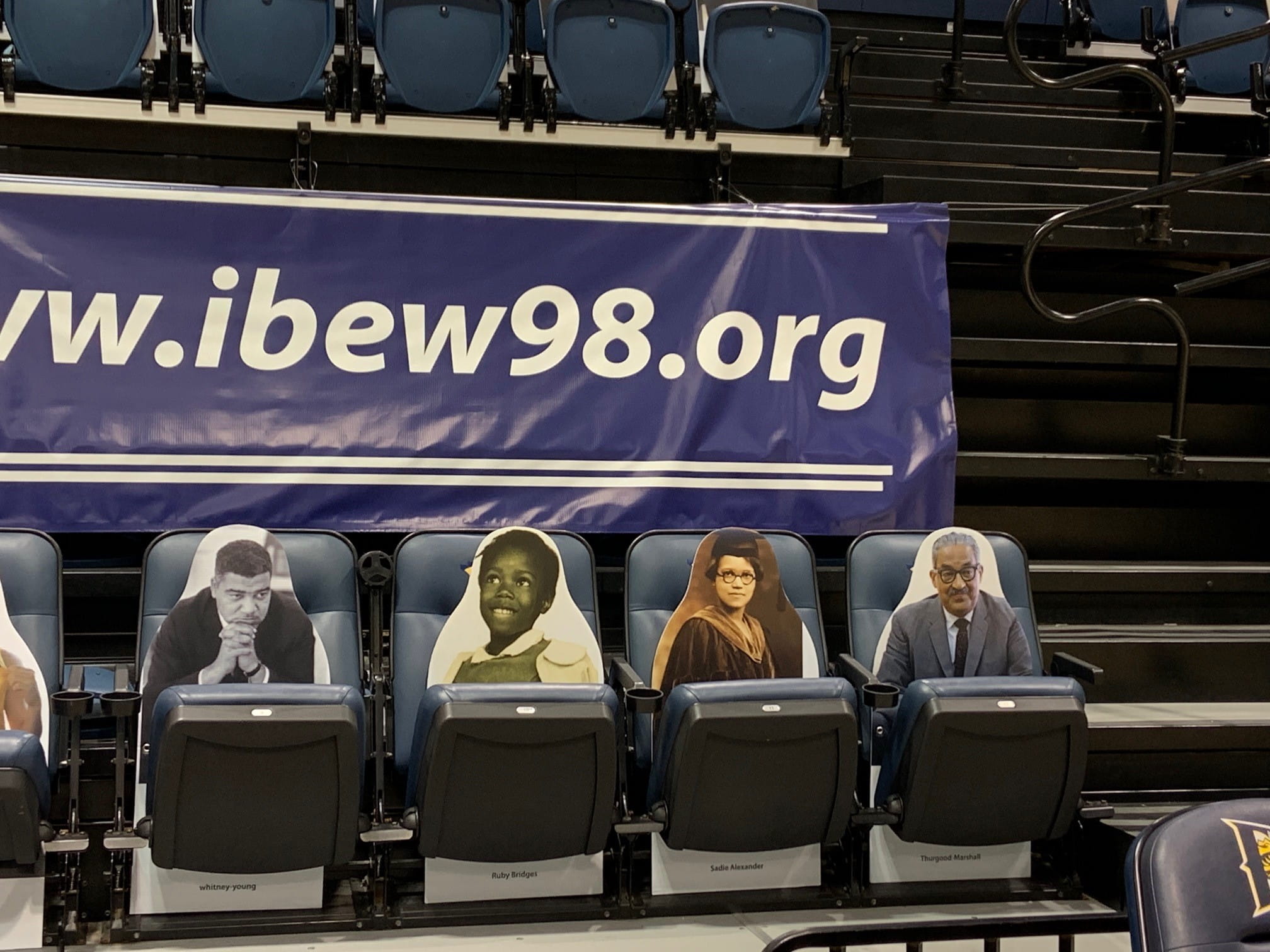A Very 2021 Way of Honoring Black History Month at Drexel

- Drexel University Receives Higher Education Excellence and Distinction (HEED) Award for Its Culture of Belonging
- New Research Recommendations for Supporting Autistic Adults to Ensure Their Communication Success
- Drexel Professor Runs 100 Miles, Helps Science
- ‘Too Much Going On’: Autistic Adults Overwhelmed by Nonverbal Social Cues
Please visit the ‘Drexel’s Response to Coronavirus’ website for the latest public health advisories.
If you’ve seen a live sports game on television or through streaming during the COVID-19 pandemic, you might have seen cardboard cutouts of everyone from fans to celebrities to pets — a creative way to safely fill the stands in accordance with related health and safety protocols and regulations.
Though no fan attendance has been allowed at home events at Drexel University, Drexel has still joined in on this phenomenon, starting back in November with an opportunity for cutouts to be placed in the Daskalakis Athletic Center (DAC) through a “Pack the DAC” virtual fan campaign. In February, those were joined by some very special cutouts representing local and historical Black figures in honor of Black History Month. Those cutouts — including two Drexel alumni — were featured in the first row of the DAC’s fan section.
DrexelNow asked Assistant Athletics Director of External Relations Sean Joyce and Director of the Center for Black Culture (CBC) Shardé Johnson how the Black History Month cutouts were created and chosen:
Sean Joyce: “To honor and celebrate Black History Month, Drexel Athletics, in partnership with Jenny Carolina-Bell in the Office of Alumni Relations, had planned to showcase local Drexel Alumni Black business owners at our home basketball games. Once we learned that fans would not be permitted at home games, we still wanted to find a way to recognize Black History Month in a meaningful way. Since fan cutouts were already in the stands, it made sense to also represent both local and historical Black persons who make a difference in our community, nation and world. We appreciate the partnership with Shardé Johnson from the Center for Black Culture and Jenny Carolina-Bell.”
Shardé Johnson: “Institutional Advancement reached out for a potential Black History Month partnership between Athletics and the Center for Black Culture. Athletics has been a major supporter of the CBC, so I enthusiastically agreed. We were given the opportunity to highlight historical Black figures to be featured in the stands in the form of cutouts. My intention was to select local or lesser-known leaders that are deserving of more recognition for their efforts and accolades.”
Johnson shared the below list of those historical Black figures, complete with short biographies she compiled:

From left to right:
Dorothy Irene Height (March 24, 1912–April 20, 2010) was a civil rights and women’s right activist. Her focus areas included unemployment, voter awareness, illiteracy, and African-American women’s rights.
Ethel D. Allen (May 8, 1929–Dec. 16, 1981) was a Philadelphia physician and Republican politician who served in the Pennsylvania state cabinet as Secretary of the Commonwealth.
Fred Shuttlesworth (March 18, 1922–Oct. 5, 2011) was a civil rights activist and minister in Birmingham, Alabama. In 2008 the Birmingham-Shuttlesworth International Airport was named in his honor.
Fannie Lou Hamer (Oct. 6, 1917–March 14, 1977) was a voting and women’s rights activist and community organizer. She was the co-founder of the Freedom Democratic Party.
Cecil B. Moore (April 2, 1915–Feb. 13, 1979) was a Philadelphia lawyer and civil rights activist. He fought to integrate Philadelphia’s Girard College.
Barbara Johns-Powell (March 6, 1935–Sept. 25, 1991) was a pioneering leader in the American civil rights movement. On April 23, 1951, at the age of 16, Powell led a student strike for equal education at R.R. Moton High School in Farmville, Prince Edward County, Virginia. She later attended Drexel University to study library science and graduated in 1979 with an MS in library science from the School of Library and Information Science.
William Sidney Pittman (April 21, 1875–March 14, 1958) was an American architect and the first African-American male graduate from the then-Drexel Institute of Art, Science and Industry. His notable works include Allen Chapel AME, Knights of Pythias Temple and Zion Baptist Church. [Editor’s note: for more information on William Sidney Pittman, read this DrexelNow article about his life and legacy.]
Sadie Tanner Mossell Alexander (Jan. 2, 1898–Nov. 1, 1989) this native Philadelphian was the first African American to receive a doctoral degree in economics in the U.S. She was also the first woman to receive a law degree from the University of Pennsylvania and the first national president of Delta Sigma Theta Sorority, Inc.

From left to right:
Whitney Young (July 31, 1921–March 11, 1971) was a civil rights activist that fought to end employment discrimination. Young was also a trained social worker and a member of Alpha Phi Alpha Fraternity, Inc.
Ruby Bridges (born Sept. 8, 1954) is a civil rights activist and the first African-American child to desegregate an all-white school in Louisiana. Ruby still works to combat issues of racism through the Ruby Bridges Foundation.
Sadie Tanner Mossell Alexander (Jan. 2, 1898–Nov. 1, 1989), a native Philadelphian, was the first African American to receive a doctoral degree in economics in the U.S. She was also the first woman to receive a law degree from the University of Pennsylvania and the first national president of Delta Sigma Theta Sorority, Inc.
Thurgood Marshall (July 2, 1908–Jan. 24, 1993) was a lawyer and civil rights activist who was the first African American Associate Justice of the Supreme Court. Prior to his appointment Marshall represented the Browns in Brown v. Board of Education. He was also a member of Alpha Phi Alpha Fraternity, Inc.
In This Article
Drexel News is produced by
University Marketing and Communications.
